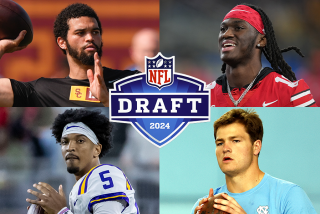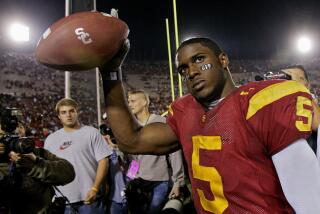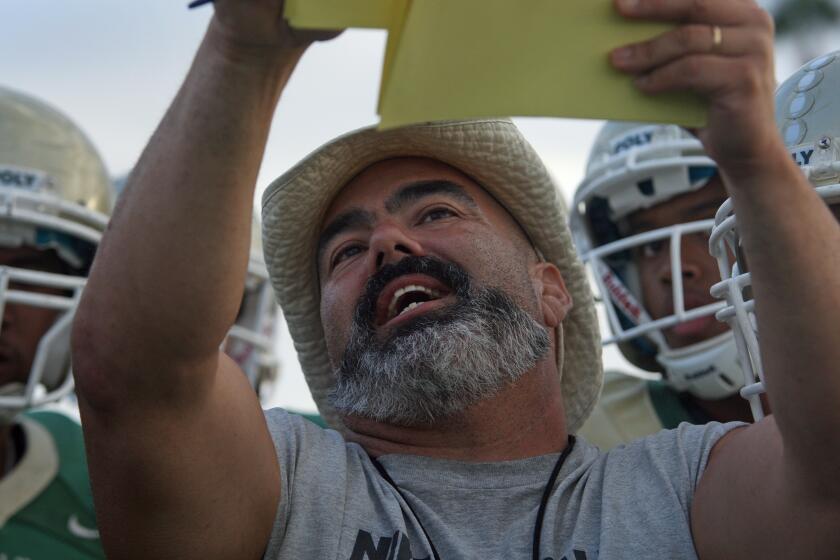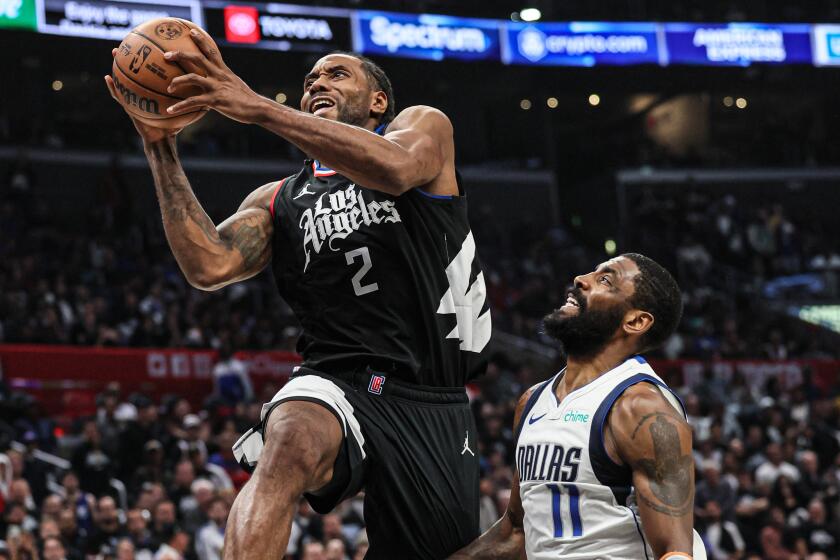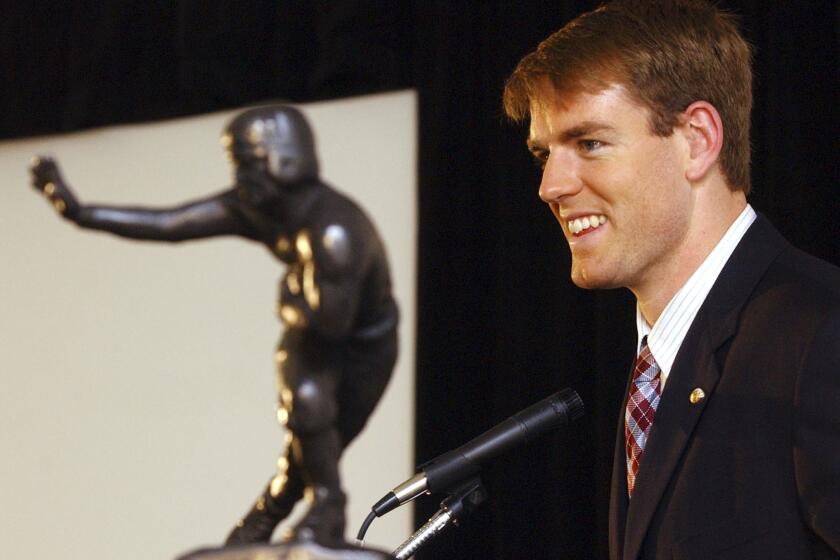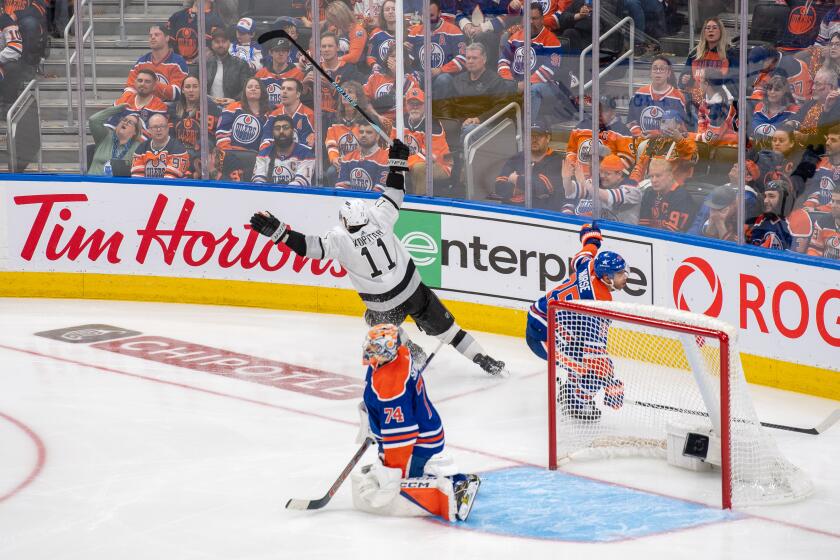Finely Owned
Dear future owner of an NFL team in Los Angeles:
Congratulations, whoever you are. Just think, once the league gets this stadium mess sorted out in, say, another five years, we’ll be one step closer to watching America’s No. 1 sport in its No. 2 market. Sure, we have no idea whether it will be an expansion franchise or a relocated one -- my money’s on a repackaged version of the New Orleans Saints -- but why get caught up in the details?
The two essentials to the NFL’s succeeding in L.A. are a great stadium and great ownership. Those are nonnegotiable. And so far, the league has yet to get either of those right. That’s where you come in. And that’s why it’s especially important for you to pay close attention to Sunday’s AFC championship game between the New England Patriots and Pittsburgh Steelers.
It’s no accident that these two franchises are, yet again, one victory from the Super Bowl. Likewise, it’s more than a coincidence that Pittsburgh’s Dan Rooney and New England’s Robert Kraft are two of the best team owners in all of sports, let alone the NFL.
Let me give you an example of what kind of guy Rooney is. The Steelers share Heinz Field with the University of Pittsburgh and could very easily treat the Panthers as second-class citizens. The Steelers rule that town, after all, and the Rooneys are Steel City royalty, having owned the franchise since its inception. But instead of big-footing the university, the Steelers have treated it as an equal partner.
Throughout the regular season, for instance, both end zones at Heinz Field read simply “Pittsburgh.” It wasn’t until the Panthers’ season was finished that Rooney had “Steelers” painted on the grass at one end. He didn’t want the college players to feel like visitors in their own home. It was a simple gesture, but a meaningful one.
Every year, the stadium also plays host to five high school championship games. That’s the way it should be, of course, seeing as the taxpayers helped pay for it. But Rooney doesn’t put up a fight about it or lay down all kinds of unreasonable rules for the visitors. He welcomes them. And although that doesn’t make him a hero, it does set him apart.
Consider the Pittsburgh Pirates, for instance. They initially resisted the idea of letting high schools play their championship games at PNC Park but finally buckled to public pressure. The schools had to jump through hoops, though, and the players had to abide by some pretty unusual rules. The way I hear it, the outfielders were told they couldn’t stand in the same spot from inning to inning because it would kill the grass. Give me a break.
When you develop a stadium in L.A., whether you’re starting from scratch or refurbishing an old place, try to emulate the Rooneys. Yes, you’ll have to do it on your dime; we in L.A. have made it clear we don’t want to commit public funds to building one of those palaces. But you’ll get a lot further if you’re viewed as a bridge-builder instead of a toll-taker.
Then again, people’s perceptions of you could change over time. Just look at the way people in New England have embraced Kraft. They thought he was a buffoon in 1994, when he paid a record $170 million to buy the Patriots. By their thinking, he got fleeced. And who was Kraft to argue? Not only were the Patriots bottom dwellers who went 19-61 in the five seasons before he bought them, but they were playing in a dump of a stadium, and couldn’t sell out a home game.
In 1993, the season before Kraft bought them, the only time the Patriots avoided a television blackout was the finale against Miami, and that was because fans were treating the game as a farewell -- or maybe a good riddance -- figuring the franchise was moving to St. Louis. But when Kraft bought the team, he announced he was staying put.
Loyalty matters to this guy, and so does family. Behind his desk at Gillette Stadium, the state-of-the-art venue he built with private money, are four poster-sized pictures of his sons. The walls are covered with photos of family and friends. And right down the hall is the office of his wife, Myra. They’ve been married for 41 years.
Let me tell you, Myra has believed in her husband a lot longer than most people have. Remember when the Patriots gave up a first-round pick in 2000 to acquire the rights to Bill Belichick? He had been the defensive coordinator for the New York Jets for three seasons. Who gives up a first-round pick for someone who just about everybody thought was one of the worst head coaches in league history?
I used to cover the Oakland Raiders for the San Jose Mercury News. I remember when they fired Mike White after the 1996 season and were looking for a new coach. A friend of mine with ties to the Cleveland Browns called me during the coaching search and issued one warning: You’d better hope they don’t hire Belichick. Why? Because Belichick was a horrible coach and a horrible quote.
Well, my friend was only half right. Belichick still isn’t a good quote -- though he’s livened up a bit since his days with the Browns -- but he’ll go down as one of the best coaches in NFL history. He’s 8-1 in postseason games, second only to Vince Lombardi’s 9-1. Imagine that. If the Patriots win the Super Bowl this season, their coach will have a better postseason record than the guy whose name is on the trophy.
You’ve got to credit Kraft for a lot of that. He saw in Belichick what a lot of people missed. Likewise, Belichick had the vision to hire Scott Pioli, the young executive who has quietly assembled a no-name team that has won two of the last three Super Bowls.
I talked to Eddie DeBartolo this week. He’s living in Tampa, Fla., and running the family’s billion-dollar real estate business. His ownership of the San Francisco 49ers ended five years ago when he handed the team over to his sister and her husband. But ask anybody around the league about DeBartolo and they’ll tell you he’s still viewed as one of the NFL’s greatest owners. He has five Super Bowl rings and the undying devotion of the 49ers who played for him.
When the 49ers were in their heyday, virtually every player in the league wanted to play for them. DeBartolo spared no expense if it would help his team win.
That included taking players’ wives on shopping sprees, taking everyone in the organization to Hawaii for the Pro Bowl, slipping $500 in an unsigned Christmas card and sending it to the family of the lowest-ranking team scout.
On your behalf, I asked DeBartolo what’s the best piece of advice he can give an NFL owner. His response was simple: “Get the best people and get out of the way.”
He said that Kraft runs the Patriots the way he used to run the 49ers. And, so far, the Patriots are to this decade what the 49ers were to the 1980s.
“You can’t go in there and spend like a drunken sailor,” DeBartolo said. “You’ve got to have a plan. And Robert does.”
You need to follow that blueprint in L.A. We don’t need another Dan Snyder, Washington’s wee meddler who seems to think he can buy his way to the Super Bowl. We don’t need another Al Davis, Georgia Frontiere, Bill Bidwill or John York.
We need someone who will observe the best in the business and soak it in.
From the look of things, you’ve got plenty of time to learn.
*
(BEGIN TEXT OF INFOBOX)
Kraft Factor
How the New England Patriots have changed under owner Robert Kraft, who was born in Brookline, Mass., and bought the New England Patriots in 1994.
ON THE FIELD
* Before Kraft: In 34 years of operation the Patriots played in 10 playoff games. Those teams produced three division titles and one conference title.
* With Kraft: In the last decade no NFL team has won as many conference championships or more Super Bowls than the Patriots. They’ve appeared in 13 playoff games and won four division championships, three conference championships and two Super Bowl championships.
OFF THE FIELD
* Before Kraft: The Patriots were last in the NFL in revenue and attendance.
* With Kraft: According to Forbes magazine, the 2004 Patriots rank fourth in the NFL in franchise value at $861 million -- behind the Washington Redskins ($1.1 billion), Dallas Cowboys ($923 million) and Houston Texans ($905 million) -- and have a 10-year streak of consecutive sellouts.
THE STADIUM
* Old: In 1988, Kraft outbid his competition to purchase the Patriots’ stadium. It was a calculated first step in his pursuit to acquire the team. When that opportunity came in 1994, Kraft had to decide whether to commit nearly $200 million of family resources to purchase the Patriots or accept a $75-million buyout offer to void the final years of the team’s stadium lease, which would have enabled the team to move out of New England. Kraft passed on the buyout offer and bought the club.
* New: Gillette Stadium opened in 2002. It was built behind Kraft’s $325-million private investment, and remains the highest-priced privately financed sports venue of its kind.
Rooney Factor
Dan Rooney has served more than 45 years with the Pittsburgh organization. After working 20 years in various capacities with the Steelers, Rooney was appointed president of the franchise in 1975. His father, Art, had founded the team in 1933 as the Pirates. They became the Steelers in 1941.
ON THE FIELD
* From 1972 through his enshrinement in the Hall of Fame in 2000, the Steelers were AFC Central Division champions 14 times, AFC champions five times and Super Bowl champions four times. When the Steelers won the Super Bowl in 1980, they became the first team to win four Super Bowls and the only team to win back-to-back Super Bowls twice. The Steelers have played in five Super Bowls. Since 1969 they have had two coaches, Chuck Noll (1969-1991) and Bill Cowher (1992-present).
OFF THE FIELD
* Pittsburgh hasn’t been in the top 20 in population for U.S. metropolitan areas since 1998, but the Steelers rank 16th in NFL valuation ($717 million), according to Forbes magazine. The Steelers have sold out every game since 1972.
THE STADIUM
* Old: When Three Rivers Stadium was being planned in the 1960s, Rooney fought for and got a dual-purpose stadium design, rather than a horseshoe shape that would have favored baseball. It opened in 1970.
* New: Heinz Field opened in August 2001. The Steelers paid $123 million, and $158 million was paid by the state, through parking and amusement/entertainment taxes, and the Regional Asset District. Heinz, a Pittsburgh company since 1869, paid $57 million for a 20-year naming-rights contract.
More to Read
Get our high school sports newsletter
Prep Rally is devoted to the SoCal high school sports experience, bringing you scores, stories and a behind-the-scenes look at what makes prep sports so popular.
You may occasionally receive promotional content from the Los Angeles Times.
